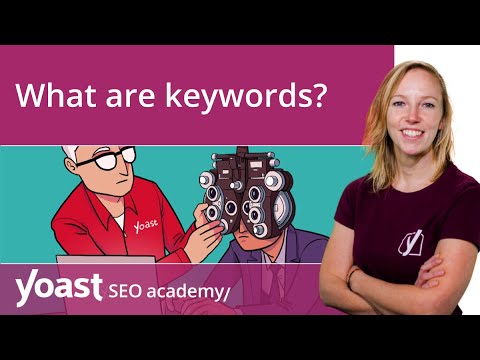What are keywords? | SEO for beginners training
What is a keyword? When looking for information
about keywords in relation to SEO, you get bombarded with information
about keyword research. And of course, keyword research
is very, very important, it's also important to know
what a keyword is exactly. And that's the thing I want to discuss
in this video. What is a keyword,
some also call it a focus keyword? A keyword is a word that describes
the content on a page best. It's the search term that you most want
your page to rank for.
So when people search for that keyword
or phrase, they should find a page on your website. Let's say you've got a website
about herbal tea. You sell all sorts of herbal tea
and you blog about herbal tea. You sell delicious Ginger tea and created
a product page about Ginger tea. What kind of search term
do you want to be found on? What kind of words do you think people will use in search engines
to find you? What would the search query look like? Probably 'ginger tea'. Because this keyword reflects
what's on the page best. If you should explain the bottom line
of your content, how would that look? What words would you use? That's your keyword or key phrases
if they're multiple words.
We tend to use the word keyword
all the time, but we don't necessarily mean
it's only one word. Keywords usually consist
of multiple words! So, in this video,
when I talk about keywords, I usually mean a phrase,
rather than a single word. Why are keywords important? One of the things Google looks at,
is content. It's the words you use on your pages. Now picture this, if every word on let's say
a blog post about ginger tea is used 2 times, then all words are sort of
of equal importance.
Google won't have a clue on what words
are important and what words are not. And the words and keywords you're using
are clues for Google, it tells Google and other search engines
what the page or post is about. So if you want to make your keyword clear
to Google, you need to use it fairly often. But Google isn't the only reason
why keywords are important. Actually, it's less important, because your focus should always lie
on the user. On your visitors and potential clients. With SEO you want people to land
on your website when using a certain search term
or keyword. You need to get into the heads
of your audience and use the words they use
when they are searching. If you use the wrong keywords, you'll never get the visitors
you want or need, because your text doesn't match what
your potential audience is searching for. But if you do use the keywords people
are searching for, your business can thrive.

So if you see it like that, your keywords
should reflect what users are searching for. With the wrong keywords, you'll end up
with the wrong audience, or none at all. That's why having keywords
is really important. How do you use keywords
in your pages and posts? There was a time where you could add
a lot of keywords to your pages and posts, so-called keyword stuffing,
and you'd rank in search engines. But a text with a lot of the same keywords
in it, is also very annoying to read. And because users find these kinds of text
terrible to read, Google finds it terrible. That's why you can't rank in Google
with keyword stuffing anymore.
So what are the rules of thumb here? First and foremost, it's very important
that your content is easy to read. Of course, you should use your keywords
in your text, but don't overdo it. Usually, a keyword density of 1% to 2%
is fine. Make sure your use of keywords
is balanced throughout the text. So, don't put all your keywords
in the first paragraph, but mention it a few times
throughout the article. Use your keywords in a subheading
or a couple of subheadings, depending on the length
of your page or post. And use the keyword in your page title,
first paragraph and in your meta description. You can imagine that some keywords have more competition in search results
than other keywords. Keywords that only consist of one word,
are very common and generic and will probably have a lot of competition. We call these keywords, head keywords. While these keywords can probably
generate a lot of traffic to your site because a lot of people use them
in search engines, they are also the toughest keywords
to rank for. Another downside of focusing
on head keywords is that it might not always reflect
what the page is about.
If I'm searching for the keyword 'tea',
what do I want? Do I want to buy tea
or do I want to learn more about tea? So while head keywords might generate
a lot of traffic, the chances that my page
fits the visitor's need is actually smaller. Just focusing on head keywords
might not be your best strategy. Optimizing posts and pages
for more specific keywords is essential as well. That's where mid tail
and long tail keywords come in.
Mid and long tail keywords
are more specific and less common because they focus more on a niche. The longer (and more specific)
your search terms are, the easier it will be to rank for them. We'll discuss long tail keywords some more
in our video about keyword research. So now we've determined
what a keyword is. In the next video,
we'll go into keyword research. We'll explore everything you need
to take into account when setting up
a successful keyword strategy..



